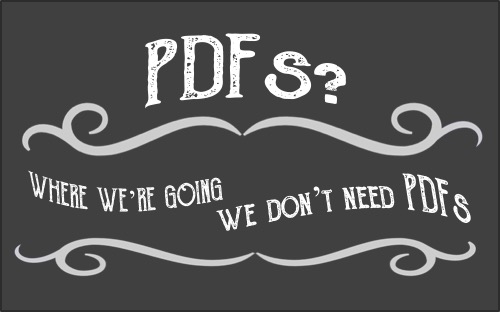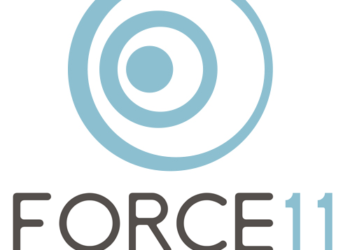Likely most of you will have heard of FORCE 111, a meta-community which grew out of two 2011 conferences (the Dagstuhl Future of Research Communication meeting and “Beyond the PDF”), and which focuses on harnessing technology to advance the media and processes of scholarly communication. Membership of FORCE 11 is free, and — disclaimer — I’ve been a member for around 5 years, in which time I’ve volunteered to help with conference programming and communications.

A research-first perspective on scholarly communication
The organization’s conference has occurred annually since 2015, and what I find particularly fascinating about it is that it tackles many of the same themes as the publishing and library conferences that I attend (SSP, UKSG, ALPSP, STM, PSP, etc.) but from the perspective of the practicing researcher; indeed, in many cases, researchers practicing in the field of scholarly communication itself. While many of the other conferences I attend are strongly focused on bringing in researchers and learning from them, actually originating from the research community2 creates subtle differences in everything from content and tone to format and processes.
Meanwhile, as is typical of academic conferences, FORCE 11 moves around between countries and continents, and as is perhaps to be expected from a researcher-led community of interest in knowledge dissemination, it is well espoused by open advocates, many of whom are working in countries with low higher education / library budgets; the organization has also developed a scheme of travel fellowships which has enabled attendance by people from over 40 countries. For all these reasons, FORCE 11 also feels more intrinsically global than any other event I’ve attended.
These and other factors ensure that FORCE 11 is always an eye-opening conference, in terms of surfacing research, projects, etc., that are pushing at the boundaries of how knowledge is communicated and shared. There is a sense that while business models and entrenched systems (and in some cases, wilful inertia) may slow the pace of change among publishers and libraries, researchers can and will circumvent the status quo and / or reinvent the landscape of research communication from scratch: seeing problems, solving them, perhaps not in ways that are strongly scalable — yet? — but in ways that meet the needs of the subset communities they serve. We know that one size does not fit all when it comes to scholarly information formats and models. The small scale initiatives reported at (and sometimes funded in part by) FORCE 11 may reflect a more micro / nodal approach to products and services that in turn reflects this age of anti-consolidation and shrinking political horizons.
Making it affordable
FORCE 11 also provides or helps to find financial support for projects such as the data citation principles. The launch of its week-long summer school (the “scholarly communications institute”, or FSCI) was in part an effort to generate additional income to support funding for such projects. At the time, I thought FSCI was an audacious move for such a young organization with minimal — to the point of non-existent — staffing. Over the years, I’ve been involved in or party to the running of other similar community organizations; most run on a shoestring, with tight margins, and volunteers who are never quite as available or organized as they would like to be. A new initiative on the scale of a week-long course would likely be too expensive (both financially and in terms of resourcing), too complex, and too unproven for most such associations to contemplate. Most scholarly publishing organizations would probably also consider the market for education in scholarly communication to be well served already, with all the above mentioned organizations and more providing webinars, one-day seminars and courses, intensive workshops and masterclasses, and a range of conferences of different lengths, including several with a practical focus — options, it could be assumed, for every job role, career level and budget.
Again, the secret strength of FORCE11 is its roots in and support from researchers themselves. These are people who expect to have to apply for funding, and who have valuable experience of doing so, not least in knowing which kinds of organizations to approach. FORCE11 has been the recipient of grants from funders like the Sloane Foundation and the NIH, neither of which (I think) would be likely to consider library or publishing associations as eligible applicants. Similarly, FORCE11’s to-the-letter non-profit status (any and all surplus is reinvested) helps it access other in-kind support that wouldn’t be offered to other organizations, even those nominally registered as charities. The first FSCI was financially supported by the University of California, San Diego, for example. And it continues to be a campus-based initiative. Keeping costs down in these ways means FSCI registration rates are substantially lower than those of broadly similar courses.
Putting change front and center
From the outside, that’s about it in terms of what might seem unique about FSCI. Its themes will feel familiar: impact, collaboration, reproducibility, peer review, questionable publishing practices, data, code, and open, open, open. Its teaching mechanisms are also tried and tested: lectures, seminars, hands-on training, group activities and intensive coursework. But aside from its researcher-orientation and affordability, there’s one other thing that I think is truly different about both FORCE 11 and FSCI: pretty much everyone involved is a change maker. Of course, you find such people in every community and at every event, but rarely would you describe everyone there in this way. With FORCE 11 and FSCI, change makers are not a sub-category in a Venn diagram, overlapping with the overall theme. Change IS the theme. For me, one of the most exciting ways in which FSCI is different is that it is focused not on providing training about where we’re at (“this is how university libraries / scholarly publishing work”), but on transforming science and scholarship, and training up a new generation of thinkers to envision and bring about that change. As with the any such initiative, there’s no guarantee that each and every idea emerging from this cauldron will survive or scale. But for anyone wanting to say that they are truly up to speed with all the innovations in scholarly communication, I’d encourage them to pay close attention to what’s being taught and discussed in this forum.
The next FORCE 11 Scholarly Communication Institute (FSCI) takes place in San Diego from July 30 to August 3, 2018. The annual FORCE 11 conference takes place in Montréal from October 11-12, 2018.
1 Not least because of Alice’s Scholarly Kitchen interview with Cameron Neylon last year
2 Seven of the eight organizers of the original meetings were researchers – Elsevier’s Anita de Waard was also among the organizers of the Dagstuhl meeting. See Alice’s interview (above) and Cameron Neylon’s recent article in Insights for more detail: Neylon, C. (2018). Social infrastructures in research communication: a personal view of the FORCE11 story. Insights, 31, 8. DOI: http://doi.org/10.1629/uksg.404



